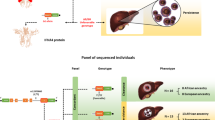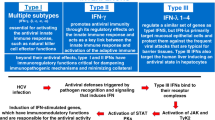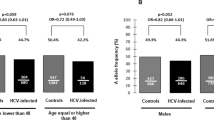Abstract
Chronic hepatitis C virus (HCV) infection affects nearly 170 million individuals worldwide. Treatment of HCV with pegylated interferon-α-2a is successful in eradicating virus from only 30 to 80% of those treated. Interleukin-6 (IL-6) is an important cytokine involved in the immune response to infectious agents and in vitro studies suggest that host genetic variation, particularly haplotypes, may affect IL-6 expression. We examined the contribution of haplotypes in the IL-6 gene on sustained viral response (SVR) to the therapy for chronic HCV infection. We observed the IL-6 T-T-G-G-G-G-C-A-G-A haplotype to be associated with a lower risk of achieving SVR among Caucasian Americans (CAs) ((relative risk) RR=0.80; 95% CI: 0.66−0.98; P=0.0261). Using a sliding window approach, the rs1800797-(G)-rs1800796-(G)-rs1800795-(G) haplotype was associated with a reduced chance of SVR (RR=0.79; 95% CI: 0.66–0.94; P=0.0081), as was the rs1800796-(G)-rs1800795-(G)-rs2069830-(C) haplotype (RR=0.78; 95% CI: 0.66–0.94; P=0.0065) among CAs. Overall, the rs1800797-(G)-rs1800796-(G)-rs1800795-(G) haplotype was independently associated with a reduced chance of SVR (RR=0.78; 95% CI: 0.62–1.0; P=0.0489) after adjustment for potential confounding factors. Our findings further illustrate the complexity of IL-6 genetic regulation and the potential importance of haplotypes on IL-6 expression. Our findings provide additional support for the potential importance of genetic variation in the IL-6 gene and the response to HCV therapy.
This is a preview of subscription content, access via your institution
Access options
Subscribe to this journal
Receive 6 digital issues and online access to articles
$119.00 per year
only $19.83 per issue
Buy this article
- Purchase on Springer Link
- Instant access to full article PDF
Prices may be subject to local taxes which are calculated during checkout



Similar content being viewed by others
References
Armstrong GL, Wasley A, Simard EP, McQuillan GM, Kuhnert WL, Alter MJ et al. The prevalence of hepatitis C virus infection in the United States, 1999 through 2002. Ann Intern Med 2006; 144: 705–714.
Brown RS . Hepatitis C and liver transplantation. Nature 2005; 436: 973–978.
Fried MW . Side effects of therapy of hepatitis C and their management. Hepatology 2002; 36: S237–S244.
Manns MP, McHutchison JG, Gordon SC, Rustgi VK, Shiffman M, Reindollar R et al. Peginterferon alfa-2b plus ribavirin compared with interferon alfa-2b plus ribavirin for initial treatment of chronic hepatitis C: a randomised trial. Lancet 2001; 358: 958–965.
Conjeevaram HS, Fried MW, Jeffers LJ, Terrault NA, Wiley-Lucas TE, Afdhal N et al Peginterferon and ribavirin treatment in African American and Caucasian American patients with hepatitis C genotype 1. Gastroenterology 2006; 131: 470–477.
Jeffers LJ, Cassidy W, Howell CD, Hu S, Reddy KR . Peginterferon alfa-2a (40 kd) and ribavirin for black American patients with chronic HCV genotype 1. Hepatology 2004; 39: 1702–1708.
Muir AJ, Bornstein, JD, Killenberg PG . Peginterferon alfa-2b and ribavirin for the treatment of chronic hepatitis C in blacks and non-Hispanic whites. N Engl J Med 2004; 350: 2265–2271.
Ramadori G, Christ B . Cytokines and the hepatic acute-phase response. Semin Liver Dis 1999; 19: 141–155.
Huang Y, Feld JJ, Sapp RK, Nanda S, Lin JH, Blatt LM et al. Defective hepatic response to interferon and activation of suppressor of cytokine signaling 3 in chronic hepatitis C. Gastroenterology 2007; 132: 733–744.
Fishman D, Faulds G, Jeffery R, Mohamed-Ali V, Yudkin JS, Humphries S et al. The effect of novel polymorphisms in the interleukin-6 (IL-6) gene on IL-6 transcription and plasma IL-6 levels, and an association with systemic-onset juvenile chronic arthritis. J Clin Invest 1998; 102: 1369–1376.
Terry CF, Loukaci V, Green FR . Cooperative influence of genetic polymorphisms on interleukin 6 transcriptional regulation. J Biol Chem 2000; 275: 18138–18144.
Nattermann J, Vogel M, Berg T, Danta M, Axel B, Mayr C et al. Effect of the interleukin-6 C174G gene polymorphism on treatment of acute and chronic hepatitis C in human immunodeficiency virus coinfected patients. Hepatology 2007; 46: 1016–1025.
Ishak K, Baptista A, Bianchi L, Callea F, De Groote J, Gudat F et al. Histological grading and staging of chronic hepatitis. J Hepatol 1995; 22: 696–699.
Zou G . A modified Poisson regression approach to prospective studies with binary data. Am J Epidemiol 2004; 159: 702–706.
Conjeevaram HS, Fried MW, Jeffers LJ, Terrault NA, Wiley-Lucas TE, Afdhal N . Peg interferon and ribavirin treatment in African Americans and Caucasian American patients with chronic hepatitis C genotype I. J Gastroenterology 2006; 131: 470–477.
Yee LJ, Tang YM, Kleiner DE, Wang D, Im K, Wahed A et al. Myxovirus-1 and protein kinase haplotypes and fibrosis in chronic hepatitis C virus. Hepatology 2007; 46: 74–83.
Mathias RA, Gao P, Goldstein JL, Wilson AF, Pugh EW, Furbert-Harris P et al. A graphical assessment of P-values from sliding window haplotype tests of association to identify asthma susceptibility loci on chromosome 11q BMC. Genetics 2006; 7: 38.
Pritchard JK, Stephens M, Donnelly P . Inference of population structure using multilocus genotype data. Genetics 2000; 155: 945–959.
Pritchard JK, Stephens M, Rosenberg NA, Donnelly P . Association mapping in structured populations. Am J Hum Genet 2000; 67: 170–781.
Acknowledgements
This clinical study was a co-operative agreement funded by the NIDDK and co-funded by the National Center on Minority Health and Health Disparities (NCMHD), with a Co-operative Research and Development Agreement (CRADA) with Roche Laboratories Inc., Grant numbers: U01 DK60329, U01 DK60340, U01 DK60324, U01 DK60344, U01 DK60327, U01 DK60335, U01 DK60352, U01 DK60342, U01 DK60345, U01 DK60309, U01 DK60346, U01 DK60349 and U01 DK60341. Other support: National Center for Research Resources (NCRR), Intramural Research Program of the NIH, NIDDK, Center for Cancer Research, General Clinical Research Centers Program Grants: M01 RR00645 (New York Presbyterian), M02 RR000079 (University of California, San Francisco), M01 RR16500 (University of Maryland), M01 RR000042 (University of Michigan) and M01 RR00046 (University of North Carolina). In addition support for Dr Leland J Yee was provided by a National Institutes of Health Clinical Research Career Development Award Grant (1KL2 RR024154-02).
Author information
Authors and Affiliations
Consortia
Corresponding authors
Additional information
Supplementary Information accompanies the paper on Genes and Immunity website (http://www.nature.com/gene)
Appendix
Appendix
Members of Virahep-C contributing to the study include: from the Beth Israel Deaconess Medical Center, Boston, MA: Nezam Afdhal, MD (Principal Investigator), Tiffany Geahigan, PA-C, MS (Research Coordinator); from the New York-Presbyterian Medical Center, New York, NY: Robert S Brown, Jr, MD, MPH (Principal Investigator), Lorna Dove, MD, MPH (Co-Investigator), Shana Stovel, MPH (Study Coordinator); from the University of California, San Francisco, San Francisco, CA: Norah Terrault, MD, MPH (Principal Investigator), Stephanie Straley, PA-C, Eliana Agudelo, PA-C, Melissa Hinds, BA (Clinical Research Coordinator); from Rush University, Chicago, IL: Thelma E Wiley, MD (Principal Investigator), Monique Williams, RN (Study Coordinator); from the University of Maryland, Baltimore, MD: Charles D Howell, MD (Principal Investigator), Karen Callison, RN (Study Coordinator); from the University of Miami, Miami, FL: Lennox J Jeffers, MD (Principal Investigator), Shvawn McPherson Baker, PharmD (Co-Investigator), Maria DeMedina, MSPH (Project Manager), Carol Hermitt, MD (Project Coordinator); from the University of Michigan, Ann Arbor, MI: Hari S Conjeevaram, MD, MS (Principal Investigator), Robert J Fontana, MD (Co-Investigator), Donna Harsh, MS (Study Coordinator); from the University of North Carolina, Chapel Hill, NC: Michael W Fried, MD (Principal Investigator,), Scott R Smith, PhD (Co-Investigator), Dickens Theodore, MD, MPH (Co-Investigator), Steven Zacks, MD, MPH, FRCPC (Co-Investigator), Roshan Shrestha, MD (Co-Investigator), Karen Dougherty, NP (Co-Investigator), Paris Davis (Study Coordinator), Shirley Brown (Study Coordinator); from St. Louis University, St. Louis, MO: John E Tavis, PhD (Principal Investigator), Adrian Di Bisceglie, MD (Co-Investigator), Ermei Yao, PhD (Co-Investigator), Maureen Donlin, PhD (Co-Investigator), Nathan Cannon, BS (Graduate Student), Ping Wang, BS (Lab Technician); from Cedars-Sinai Medical Center, Los Angeles, CA: Huiying Yang, MD, PhD (Principal Investigator), George Tang, PhD (Project Scientist), Dai Wang, PhD (Project Scientist); from the University of Colorado Health Sciences Center, Denver, CO: Hugo R Rosen, MD (Principal Investigator), James R Burton, MD (Co-Investigator), Jared Klarquist (Lab Technician); from Veteran's Administration, Portland, OR: Scott Weston (Lab Technician); from Indiana University, Bloomington, IN: Milton W Taylor, PhD (Principal Investigator), Corneliu Sanda, MD (Post-doctoral Associate), Joel Schaley, PhD (Post-doctoral Associate), Mary Ferris (Lab Assistant); from the Data Coordinating Center, Graduate School of Public Health at the University of Pittsburgh, Pittsburgh, PA: Steven H Belle, PhD (Principal Investigator), Richard A Bilonick, PhD (Statistician), Geoffrey Block, MD (Co-Investigator), Jennifer Cline, BS (Data Manager), Marika Haritos, MS (Statistician), KyungAh Im, MS (Statistician), Stephanie Kelley, MS (Data Manager), Sherry Kelsey, PhD (Co-Investigator), Laurie Koozer (Project Coordinator), Sharon Lawlor, MBA (Data Coordinator), Stephen B Thomas, PhD (Co-Investigator), Abdus Wahed, PhD (Statistician), Yuling Wei, MS (Project Coordinator), Leland J Yee, PhD (Consultant); from the National Institute of Diabetes and Digestive and Kidney Diseases: Patricia Robuck, PhD, MPH (Project Scientist), James Everhart, MD, MPH (Scientific Advisor), Jay H Hoofnagle, MD (Scientific Advisor), Edward Doo, MD (Scientific Advisor), T Jake Liang, MD (Scientific Advisor), Leonard B Seeff, MD (Scientific Advisor); from the National Cancer Institute: David E Kleiner, MD, PhD (Central Pathologist).
Rights and permissions
About this article
Cite this article
Yee, L., Im, K., Borg, B. et al. Interleukin-6 haplotypes and the response to therapy of chronic hepatitis C virus infection. Genes Immun 10, 365–372 (2009). https://doi.org/10.1038/gene.2009.26
Received:
Revised:
Accepted:
Published:
Issue Date:
DOI: https://doi.org/10.1038/gene.2009.26
Keywords
This article is cited by
-
Genetic polymorphism between the Sorani and Hawrami kurdish populations and COVID-19 outcome
Molecular Biology Reports (2023)
-
Predicting survival using clinical risk scores and non-HLA immunogenetics
Bone Marrow Transplantation (2015)
-
-572 G/C single nucleotide polymorphism of interleukin-6 and sepsis predisposition in chronic renal disease
European Journal of Clinical Microbiology & Infectious Diseases (2015)
-
Hepatitis C in African Americans
American Journal of Gastroenterology (2014)
-
Interleukin 6 promoter polymorphisms influence the outcome of chronic hepatitis C
Immunogenetics (2011)



